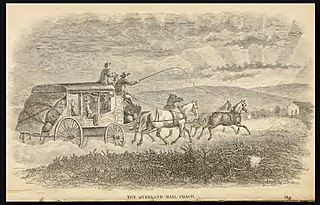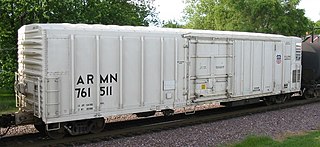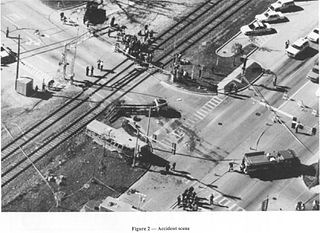Related Research Articles
The vast majority of passenger travel in the United States occurs by automobile for shorter distances and airplane or railroad for longer distances. Most cargo in the U.S. is transported by, in descending order, railroad, truck, pipeline, or boat; air shipping is typically used only for perishables and premium express shipments. Transportation is the largest source of greenhouse gas emissions in the United States.

Road transport or road transportation is a type of transport using roads. Transport on roads can be roughly grouped into the transportation of goods and transportation of people. In many countries licensing requirements and safety regulations ensure a separation of the two industries. Movement along roads may be by bike, automobile, bus, truck, or by animal such as horse or oxen. Standard networks of roads were adopted by Romans, Persians, Aztec, and other early empires, and may be regarded as a feature of empires. Cargo may be transported by trucking companies, while passengers may be transported via mass transit. Commonly defined features of modern roads include defined lanes and signage. Various classes of road exist, from two-lane local roads with at-grade intersections to controlled-access highways with all cross traffic grade-separated.

Pinkerton is a private security guard and detective agency established around 1850 in the United States by Scottish-born American cooper Allan Pinkerton and Chicago attorney Edward Rucker as the North-Western Police Agency, which later became Pinkerton & Co, and finally the Pinkerton National Detective Agency. It is currently a subsidiary of Swedish-based Securitas AB.

A conductor or guard is a train crew member responsible for operational and safety duties that do not involve actual operation of the train/locomotive. The conductor title is most common in North American railway operations, but the role is common worldwide under various job titles. In Commonwealth English, a conductor is also known as guard or train manager.

A stagecoach is a four-wheeled public transport coach used to carry paying passengers and light packages on journeys long enough to need a change of horses. It is strongly sprung and generally drawn by four horses although some versions are drawn by six horses.
Train robbery is a type of robbery, in which the goal is to steal money or other valuables being carried by trains.
Railroad police or railway police are people responsible for the protection of railroad properties, facilities, revenue, equipment, and personnel, as well as carried passengers and cargo. Railroad police may also patrol public rail transit systems.

Delivery is the process of transporting goods from a source location to a predefined destination. Cargo is primarily delivered via roads and railroads on land, shipping lanes on the sea, and airline networks in the air. Certain types of goods may be delivered via specialized networks, such as pipelines for liquid goods, power grids for electrical power and computer networks such as the Internet or broadcast networks for electronic information. Car transport is a particular subgroup; a related variant is Autorack, which involves the transport of autos by railroads.

Butterfield Overland Mail was a stagecoach service in the United States operating from 1858 to 1861. It carried passengers and U.S. Mail from two eastern termini, Memphis, Tennessee, and St. Louis, Missouri, to San Francisco, California. The routes from each eastern terminus met at Fort Smith, Arkansas, and then continued through Indian Territory (Oklahoma), Texas, New Mexico, Arizona, Mexico, and California ending in San Francisco. On March 3, 1857, Congress authorized the U.S. postmaster general, at that time Aaron V. Brown, to contract for delivery of the U.S. mail from St. Louis to San Francisco. Prior to this, U.S. Mail bound for the Far West had been delivered by the San Antonio and San Diego Mail Line since June 1857.

A refrigerator car is a refrigerated boxcar (U.S.), a piece of railroad rolling stock designed to carry perishable freight at specific temperatures. Refrigerator cars differ from simple insulated boxcars and ventilated boxcars, neither of which are fitted with cooling apparatus. Reefers can be ice-cooled, come equipped with any one of a variety of mechanical refrigeration systems, or utilize carbon dioxide as a cooling agent. Milk cars may or may not include a cooling system, but are equipped with high-speed trucks and other modifications that allow them to travel with passenger trains.


FedEx Express is a major American cargo airline based in Memphis, Tennessee, United States. As of 2023, it is the world's largest cargo airline in terms of fleet size and freight tons flown. It is the namesake and leading subsidiary of FedEx Corporation, delivering freight and packages to more than 375 destinations over 220 countries across six continents each day. FedEx Express is also the world's largest express transportation company.

In the airline industry, a baggage handler is a person who loads and unloads baggage, and other cargo for transport via aircraft. With most airlines, the formal job title is "fleet service agent/clerk", though the position is commonly known amongst airline employees as a "ramp agent", due to the job's location on the airport ramp (tarmac).

An intercity bus service or intercity coach service, also called a long-distance, express, over-the-road, commercial, long-haul, or highway bus or coach service, is a public transport service using coaches to carry passengers significant distances between different cities, towns, or other populated areas. Unlike a transit bus service, which has frequent stops throughout a city or town, an intercity bus service generally has a single stop at one location in or near a city, and travels long distances without stopping at all. Intercity bus services may be operated by government agencies or private industry, for profit and not for profit. Intercity coach travel can serve areas or countries with no train services, or may be set up to compete with trains by providing a more flexible or cheaper alternative.

The 1995 Fox River Grove bus–train collision was a grade crossing collision that killed seven students riding aboard a school bus in Fox River Grove, Illinois, on the morning of October 25, 1995. The school bus, driven by a substitute driver, was stopped at a traffic light with the rearmost portion extending onto a portion of the railroad tracks when it was struck by a Metra Union Pacific Northwest Line train en route to Chicago.

A brakeman is a rail transport worker whose original job was to assist the braking of a train by applying brakes on individual wagons. The advent of through brakes, brakes on every wagon which could be controlled by the driver, made this role redundant, although the name lives on, for example, in the United States where brakemen carry out a variety of functions both on the track and within trains.

Barnard's Express, later known as the British Columbia Express Company or BX, was a pioneer transportation company that served the Cariboo and Fraser-Fort George regions in British Columbia, Canada from 1861 until 1921.

An armored vehicle is an armored van or truck used to transport valuables, such as large quantities of money or other valuables, especially for banks or retail companies. The armored car is typically a multifunctional vehicle designed to protect and ensure the wellbeing of the transported contents and guards. Typically customized on a basic van or truck chassis, they feature bullet-resistant glass, armor plating, and reinforced shells and cabs. Armored cars are designed to resist attempts at robbery and hijacking, being able to withstand bullets from most handguns and rifles, as well as extreme degrees of heat, explosives, and collisions.
NAPAREX, LLC, is a National Logistics services company, based in the United States. The name "NAPAREX" is a syllabic abbreviation of the name of the company's services, National Parcel Express.

Railway Express Agency (REA), founded as the American Railway Express Agency and later renamed the American Railway Express Inc., was a national package delivery service that operated in the United States from 1918 to 1975. REA arranged transport and delivery via existing railroad infrastructure, much as today's UPS or DHL companies use roads and air transport. It was created through the forced consolidation of existing services into a national near-monopoly to ensure the rapid and safe movement of parcels, money, and goods during World War I.